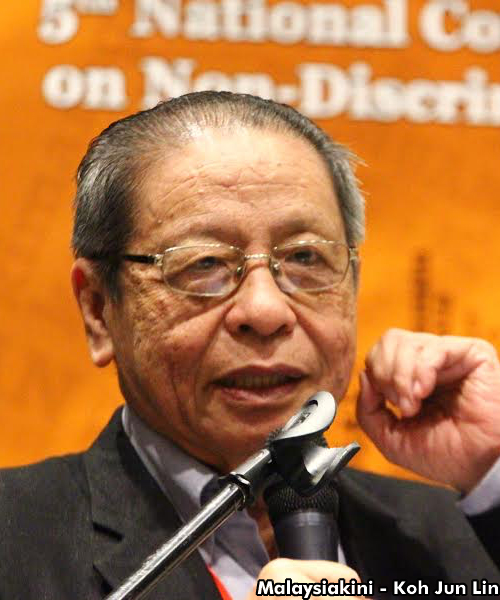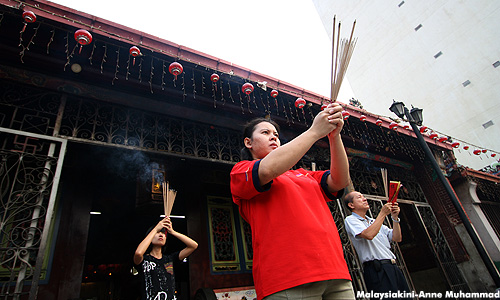COMMENT Once again, the spotlight is on the DAP, this time following a recent survey by Institut Darul Ehsan (IDE), which found that nearly two-thirds of Malay respondents in Selangor believed the DAP to be a racial party that looked after the interests of the Chinese community, while more than half agreed that the DAP was anti-Malay and anti-Islam.
Unfortunately, this pervasive image, as misplaced as it is, represents the perceived reality that the DAP has to grapple with. It is a narrative that has been systematically cultivated by Umno and its propaganda machinery, through the media, the national education system and government civic training courses.
Painting the DAP as the bogeyman for the Malays is a conscious strategy by the ruling regime. From their point of view, it is an entirely rational one.
When a party’s raison d’être is predicated upon the propagation of a race-based narrative, that is, Umno as the defender of the Malays and the only bastion preventing the Chinese from controlling the country and condemning the Malays to suffer the fate of the Palestinians, then the party’s continued survival hinges upon the construction and perpetuation of a Chinese threat.
Politically, this threat is embodied in the DAP, a party that is persistently labelled as a Chinese party, despite the fact that the DAP has more ethnic Indian elected representatives than the MIC. In fact, the DAP even has Malay representatives at every tier of legislature – the Senate, the House of Representatives, state assembly and local government.
This anti-DAP narrative is evident if one were to observe the propaganda espoused by Umno leaders and their media machinery. In the last few years, the DAP has been accused of, inter alia, attempting to turn Malaysia into a Christian state, leaking state secrets to PAP leaders in Singapore and causing the May 13 racial riots.
While such charges may sound ludicrous and often result in defamatory lawsuits found in favour of DAP leaders , the same thread of racial and religious fear mongering continues to be repeated over and over again.
In the most recent Umno General Assembly, Prime Minister Najib Abdul Razak even went so far as to state in his policy speech that Malaysians had only two political choices: “Either a coalition led by Umno or another coalition led or dominated by DAP… if Umno were rejected, this country will be ruled by those who are against the Islamic struggle, who reject the Malay and bumiputera struggle.”
Umno will engineer rivalry
Besides the Umno president, the DAP was practically the target of every other firebrand delegate. Not PKR, not PAS and not even Amanah. But the DAP – a party which, in the last two general elections, has not even contested in any Umno constituency. How can the DAP be Umno’s number one enemy when the two parties are not even, at this point in time, electoral rivals?
In fact, Umno has shown that it would go out of its way to engineer the supposed “Chinese-Malay” rivalry, when in the last general election, Umno usurped the MCA seat of Gelang Patah in order to field former Johor Mentri Besar Abdul Ghani Othman against DAP parliamentary leader Lim Kit Siang. Just so that it can justify its claim that the Chinese DAP has come to Johor to challenge Malay authority.
And if having to deal with Umno’s constant barrage of mistruths is not enough, the DAP now has PAS to contend with. Following the break-up of Pakatan Rakyat and the Islamist party’s retreat to hard-line conservatism, PAS has set its targets on the DAP, thus reinforcing the perception of the latter as being anti-Islam.
 A clear illustration of this is the allegation by PAS research director Zuhdi Marzuki (
photo
), who attempted to provoke Muslim prejudices by making the audacious claim that the
DAP had been offered RM1.2 billion by Israel
in return for the establishment of a naval base in Port Dickson if the DAP managed to capture the federal government. This assertion, which Zuhdi is unable to prove, has since been refuted as a “malicious slander” that originated from a highly questionable source.
A clear illustration of this is the allegation by PAS research director Zuhdi Marzuki (
photo
), who attempted to provoke Muslim prejudices by making the audacious claim that the
DAP had been offered RM1.2 billion by Israel
in return for the establishment of a naval base in Port Dickson if the DAP managed to capture the federal government. This assertion, which Zuhdi is unable to prove, has since been refuted as a “malicious slander” that originated from a highly questionable source.
Unfortunately, wild accusations by Pas leaders against the DAP have become the rule rather than the exception. Only recently, Pas information chief Nasrudin Hassan Tantawi admitted regret and agreed to retract his “baseless” statements made against the DAP-led Penang state government, and was promptly ordered by the Penang High Court to pay costs of RM10,000.
Prior to this, PAS president Abdul Hadi Awang had suggested that the restoration of local government elections may trigger racial riots and Chinese dominance in urban areas, and proceeded to single out the “chauvinist” DAP as the prime mover of the third vote.
Such ill-intentioned assertions, which are completely ignorant of the fact that rapid urbanisation over the last three decades has resulted in nearly 90 percent out of 148 local councils being Malay-majority in ethnic composition, while only two percent have actual Chinese majorities, are demonstrative of the typical politics of fear and emotion regularly employed against the DAP.
A convenient target
The fact of the matter is that the DAP will continue to be an easy target for Umno and PAS, particularly as the two Malay-based parties lose further ground. Although Umno managed to increase its parliamentary seats to 88 from 79 in the previous general election, it came close to losing federal power for the first time in history when the BN coalition only managed to win 47 percent of the popular vote, clinging on to power with highly gerrymandered electoral boundaries and malapportioned constituencies.
Meanwhile, PAS did not fare any better, as its share of parliamentary seats was not only reduced, the party also lost the state of Kedah, which it was ruling from 2008. Sensing an opportunity, Umno began to up the ante by blaming PAS’ losses on the premise that the Islamist party had compromised its religious struggle and was playing second fiddle to a more dominant DAP.
Unfortunately, the reaction from PAS was more emotive than empirical. Instead of taking stock from the fact that it had actually made electoral gains in Penang and Selangor, where the Pakatan Rakyat state governments in both states were able to boast of good performance and cleaner administration, PAS chose to succumb to Umno pressure .
Thus followed attempts to introduce a Private Member’s Bill in Parliament to amend federal law in order to allow the implementation of the PAS-controlled Kelantan government’s controversial syariah criminal code, better known as the Hudud Enactment. Not only did such a move violate the coalition’s agreed Common Policy Framework, the Islamist party proceeded with the motion, despite promises to the contrary by its very own leaders.
As can be expected, the DAP was at the forefront of the controversial debate, not only in calling out the glaring contradictions in PAS’ actions, but also in stating its objections against the implementation of hudud in Kelantan, a stand that has been consistently articulated since the enactment was passed in the state 1993.
With Umno stirring the hornet’s nest by offering to support the hudud plan, despite ironically being the main impediment to the implementation of the criminal code two decades earlier, an emboldened PAS began to lash out at the DAP with anti-Islamic epithets, thus sealing the fate of the Pakatan Rakyat coalition.
A victim of circumstances
While the ethno-nationalist narrative propagated by both sides of the Malay political divide has, over decades, deeply embedded the perception of the DAP as the political antithesis of the Malays, the image is further reinforced by a few other circumstantial factors, namely its demographical roots, its ideology and the lack of alternatives.
Since its inception 50 years ago, the DAP has been largely based in urban areas. Although the party does not restrict its political activities to any geographical boundaries, most of its success has historically been in cities and towns, with support drawn from the urban working class. Hence, as urban centres used to be predominantly populated by non-Malay communities such as the Chinese and Indians, it should come as no surprise that the party would draw the bulk of its membership from this demography.
Secondly, the idea of a non-communal and secular party is also somewhat anathema to the prevailing ethnocentric political milieu in Malaysia. With the ethno-nationalist agenda so pervasively entrenched, there is little incentive for Malays to choose a party that does not offer them either social supremacy or paradise in the afterlife. Therefore, it is unsurprising that the party has found little traction among the general Malay populace.
Thirdly, until PKR was formed in 1999, marginalised sections of society had little avenue for political representation. As PAS membership is exclusive to Muslims, the only mainstream option available for non-Malay and non-Muslim minorities was the DAP, with other alternatives being minor left-wing parties such as Parti Sosialis Malaysia and Parti Rakyat Malaysia.
Thus, the DAP came to be a natural choice, particularly among non-Malays and non-Muslims, for those seeking redress from a system which they believed to be persecuting them. In other words, the DAP is a victim of circumstances in the emotive world of identity politics. This is the DAP dilemma.
Is DAP really anti-Malay, anti-Islam?
 As Lim, who is also the DAP parliamentary leader, put it, it is simply illogical for any political party seeking to gain the support of all Malaysians to be anti any race or religion, much less anti-Malay or anti-Islam, particularly when the Malays make up the majority of the country and Islam is constitutionally entrenched as the religion of the Federation.
As Lim, who is also the DAP parliamentary leader, put it, it is simply illogical for any political party seeking to gain the support of all Malaysians to be anti any race or religion, much less anti-Malay or anti-Islam, particularly when the Malays make up the majority of the country and Islam is constitutionally entrenched as the religion of the Federation.
Furthermore, the availability of tools such as the Sedition Act and other recriminatory laws, often applied with injudicious bias against opposition politicians, would ensure that anyone harbouring such tendencies would be dealt with severely.
In fact, a party with such provocative characteristics would not even be allowed to exist, as was the case with the Malayan Communist Party. Certainly, such a party would not have been able to form the second largest bloc in Parliament, nor attract the membership of Malaysia’s eminent national laureate.
While it may appear that the DAP faces a seemingly insurmountable task of countering the hardened negative perceptions of the party, there are some traces of hope. The IDE survey on Malay respondents in Selangor, quoted earlier, for example, did find that anti-DAP sentiments were lower in constituencies served by DAP representatives, such as in Serdang and Subang Jaya. This empirically proves that perceptions, however ingrained, can be tempered through information, familiarity and engagement.
That said, the DAP is not perfect and own goals are scored from time to time. As explained earlier, circumstantial factors have led the DAP to be not only primarily non-Malay in make-up, but also a natural congregation for marginalised minorities with understandable misgivings over the ethno-nationalist hegemony and creeping Islamisation of the ruling regime. In this context, continuous provocation from Umno and PAS would occasionally elicit strong and sometimes ill-advised counter-reactions from DAP leaders.
Take, for example, the contentious hudud debate. While some DAP top leaders are able to present a more nuanced argument in opposing the Islamic legislation – taking care not to get drawn into an anti-Islamic stance, the same subtlety is not always exhibited by leaders down the line. Thus, statements would often get taken out of context and manipulated to further strengthen the anti-Islamic image of the DAP. It is precisely for this reason that PAS and Umno sees it fit to play this issue up every now and again. After all, it is a tried and tested formula.
Setting a new narrative
The challenge for the DAP is to overcome its dilemma by getting the party’s messaging across to the Malays, cultivating stronger bonds with the Malay community, and in the process also developing greater cultural sensitivity vis-à-vis the demographically dominant race in Malaysia.
However, in doing so, it is vital that the DAP steers clear of the trap of narrow ethnocentrism. The dichotomous worldview of the Umno versus DAP (read: Malay versus Chinese) narrative is so entrenched and pervasive that it is often too easy to slip into the frame of the mind without realising it. Resisting it is essential, and the effort will require patience, perseverance and the wisdom to avoid responding emotionally to race-baiting and religious goading.
Perhaps, in this case, the best form of defence is a positive offence. As such, it is imperative that the DAP continuously communicates its successful track record in government, particularly in the DAP-led state of Penang.
In fact, accomplishments in poverty eradication, reducing income inequality, recording debt reduction and continuous budget surpluses, as well as attracting high-value investments and, correspondingly, high-income jobs can set the foundations for a new political narrative that promises prosperity and development based on the principles of good governance, transparency and, more importantly, a non-communal approach of needs-based policies and meritocracy.
Furthermore, Penang has also become proof that a government founded on secular ideals can not only accord respect for Islam as the official religion, but even empower it through initiatives such as institutionalised funding for Islamic schools, incentives for religious school teachers and even the implementation of elections for mosque committees.
More importantly, Penang has also shown that greater support for Islamic affairs need not come at the expense of other cultures and creeds. Among efforts taken include the symbolic use of Tamil, Mandarin and even Arabic road signs, the creation of a state executive council portfolio for non-Islamic religions and the instituting of annual allocations of more than RM1 million to the Hindu Endowment Board, which also received a new building.
 Moreover, many traditional activities and religious festivals now receive additional funding and recognition from the state, such as, to name a few, Thni Kong Seh, St Anne’s Feast and Thaipusam, all of which are now celebrated at a far larger scale than before. In fact, under the DAP-led administration, even the East Malaysian festivals of Gawai and Kaamatan are now officially celebrated by the state.
Moreover, many traditional activities and religious festivals now receive additional funding and recognition from the state, such as, to name a few, Thni Kong Seh, St Anne’s Feast and Thaipusam, all of which are now celebrated at a far larger scale than before. In fact, under the DAP-led administration, even the East Malaysian festivals of Gawai and Kaamatan are now officially celebrated by the state.
In Penang, and to an extent Selangor as well, the DAP and the Pakatan Harapan coalition have a successful model of governance based on the values of freedom, solidarity and good governance. In this non-communal model, diversity is celebrated and the relationship between Islam and other religions is not a zero-sum one. Prosperity can and should be shared by all.
At the same time, a commitment to good governance and prudent financial management has resulted in a stronger economy and more responsive welfare for all, regardless of ethnic background.
For example, the Penang’s open tender policy has seen more than 70 percent of state procurement contracts and projects being awarded to Malay contractors on merit, thus dispelling the myth that Malays are unable to compete against Chinese businesses.
Meanwhile, more than 90 percent of the beneficiaries of the state’s poverty eradication programme are Malays, not as a result of ethnic targeting but rather as a result of needs-based means testing.
In other words, this proves that there is a viable alternative narrative, which not only represents a break from the dominant ethno-religious nationalist model of Umno and PAS, but it more importantly offers hope for a better future for all Malaysians.
At the end of the day, the DAP dilemma is also the Malaysian dilemma, and the sooner we overcome it, the better.
ZAIRIL KHIR JOHARI is the MP for Bukit Bendera.

